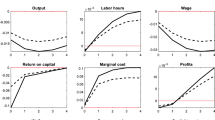Summary.
This paper devises a fiscal policy by means of which the first-best optimum equilibrium is attained as a market equilibrium in the Uzawa-Lucas model when average human capital has an external effect on productivity. The optimal policy requires the use of a subsidy to investment in human capital which can be financed by a tax on labor income. Lump-sum taxation is not required to balance the government budget either in the steady state or in the transitional phase. Physical capital income should not be taxed. Alternatively, the optimal growth path can be attained by means of a subsidy to human capital.
Similar content being viewed by others
Author information
Authors and Affiliations
Additional information
Received: March 21, 2002; revised version: September 4, 2002
RID="*"
ID="*" Financial support from the Spanish Ministry of Science and Technology through PNICDYIT grant SEC2002-03663 is gratefully acknowledged.
Rights and permissions
About this article
Cite this article
Gómez, M. Optimal fiscal policy in the Uzawa-Lucas model with externalities. Econ Theory 22, 917–925 (2003). https://doi.org/10.1007/s00199-002-0331-6
Issue Date:
DOI: https://doi.org/10.1007/s00199-002-0331-6



